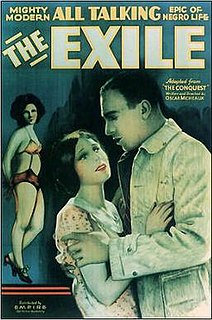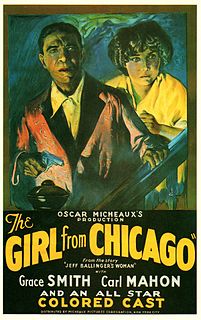Related Research Articles

Oscar Devereaux Micheaux was an African-American author, film director and independent producer of more than 44 films. Although the short-lived Lincoln Motion Picture Company was the first movie company owned and controlled by black filmmakers, Micheaux is regarded as the first major African-American feature filmmaker, a prominent producer of race film, and has been described as "the most successful African-American filmmaker of the first half of the 20th century". He produced both silent films and sound films.

Evelyn Preer, was a pioneering African-American stage and screen actress and jazz and blues singer of the 1910s through the early 1930s. Preer was known within the black community as "The First Lady of the Screen."

Juano G. "Juano" Hernández was a Puerto Rican stage and film actor who was a pioneer in the African American film industry. He made his silent picture debut in The Life of General Villa, and talking picture debut in an Oscar Micheaux film, The Girl from Chicago, which was directed at black audiences. Hernández also performed in a series of dramatic roles in mainstream Hollywood movies. His participation in the film Intruder in the Dust (1949) earned him a Golden Globe Award nomination for "New Star of the Year." Later in life he returned to Puerto Rico, where he intended to make a film based on the life of Sixto Escobar.

The Exile is a 1931 American film by Oscar Micheaux with the co-direction of the Dances and Ensemble by Leonard Harper. A drama–romance of the race film genre, The Exile was Micheaux's first feature-length talkie, and the first African-American talkie. Adapted from Micheaux's first novel, The Conquest (1913), it has some autobiographical elements: like the film's central character Jean Baptiste, Micheaux spent several years as a cattle rancher in an otherwise all-white area of South Dakota.

The race film or race movie was a genre of film produced in the United States between about 1915 and the early 1950s, consisting of films produced for black audiences, featuring black casts. Approximately five hundred race films were produced. Of these, fewer than one hundred remain. Because race films were produced outside the Hollywood studio system, they were largely forgotten by mainstream film historians until they resurfaced in the 1980s on the BET cable network. In their day, race films were very popular among African American theatergoers. Their influence continues to be felt in cinema and television marketed to African Americans.

The Girl from Chicago is a 1932 American Pre-Code drama film produced and directed by Oscar Micheaux, with an all-African-American cast including lead actors Grace Smith and Carl Mahon. The story concerns a federal agent who falls in love while on assignment in Mississippi. He helps his lover escape a local thug, and the film follows them to Harlem where they become involved in the assassination of a Cuban racketeer, played by Juano Hernández.

Alice Burton Russell was an African-American actress, producer, and the wife of director Oscar Micheaux. She appeared in several films directed by her husband.
The House Behind the Cedars is a 1927 silent race film directed, written, produced and distributed by the noted director Oscar Micheaux. It was loosely adapted from the 1900 novel of the same name by African-American writer Charles W. Chesnutt, who explored issues of race, class and identity in the post-Civil War South. No print of the film is known to exist, and it is considered lost. Micheaux remade the film in 1932 under the title Veiled Aristocrats.

Veiled Aristocrats is a 1932 American Pre-Code race film directed, written, produced and distributed by Oscar Micheaux. The film deals with the theme of "passing" by mixed-race African Americans to avoid racial discrimination, and is a remake of The House Behind the Cedars (1927), based on a novel by the same name published in 1900 by Charles W. Chesnutt. Micheaux may have borrowed the title from the 1923 novel by Gertrude Sanborn.
Ethel Moses was an American actress and dancer, billed as "the black Jean Harlow". She is best known for working in films by Oscar Micheaux.

Donald Heywood was a Trinidadian-born American songwriter, composer, writer and director. He is best remembered for composing "I'm Coming Virginia" in 1926, which became a hit for Ethel Waters. He became a prominent figure in black musical theater, and produced scores for films such as Moon Over Harlem (1939) and Murder on Lenox Avenue (1941).
Easy Street is a 1930 American film by Oscar Micheaux, an African American filmmaker. It features an African American cast. Known as the last silent achievement in his filmography, the film is considered lost. The plot reportedly revolved around a group of con artists trying to seize the savings of an old man.
The Spider's Web is a 1926 Oscar Micheaux film starring Evelyn Preer. It was remade in 1932 as The Girl from Chicago.
Andrew S. Bishop was an actor on stage and screen. He and Cleo Desmond drew adoring fans to their theatrical performances. He starred in several of Oscar Michaux's African American films.
Carman Newsome was an actor and musician in the United States. His work includes leading roles in five Oscar Micheaux films.
Willor Lee Guilford was an African American actress. She had substantial parts in several films including at least three Oscar Micheaux films.
Alfred N. Sack was the proprietor of film distribution, production, and theater owning business Sack Amusements.
Harry Henderson was an actor in theater and films in the United States. He made four films with the Colored Players Film Corporation. He was also cast in several Oscar Micheaux films and had a starring role in the film melodrama The Scar of Shame. He portrays a wealthy concert pianist in the film. He also had a lead role in the 1926 film The Prince of His Race.
William Fountaine was a film actor in the United States. He starred in Oscar Micheaux's 1922 film Uncle Jasper's Will, The Dungeon released the same year, and Deceit in 1923. He had a leading role in the well received 1929 musical film Hallelujah. According to an account of experiences filming the movie, Fountaine protested at bigoted dialogue he was supposed to say stating he "wouldn't be able to return to Harlem" if he repeated the lines in the script.
The Midnight Ace is a 1928 American crime film. Abe DeComathiere, Mabel Kelly and Oscar Roy Dugas starred. The film was directed by John H. Wade for Swan Micheaux's Dunbar Film Company. Swan Micheaux was Oscar Micheaux's brother. Swan had worked for Oscar before a failling out over his management of finances. Swan left and formed the Dunbar film company but it only made this film.
References
- ↑ History of Blacks in Film. William Grant Still Community Arts Center. 1983.
- ↑ Green, J. Ronald (March 18, 2004). With a Crooked Stick—The Films of Oscar Micheaux. Indiana University Press. ISBN 9780253027702 – via Google Books.
- ↑ Koszarski, Richard (August 27, 2008). Hollywood on the Hudson: Film and Television in New York from Griffith to Sarnoff. Rutgers University Press. ISBN 9780813545523 – via Google Books.
- 1 2 3 4 Pitts, Michael R. (17 September 2015). Poverty Row Studios, 1929-1940: An Illustrated History of 55 Independent Film Companies, with a Filmography for Each. ISBN 9781476610368.